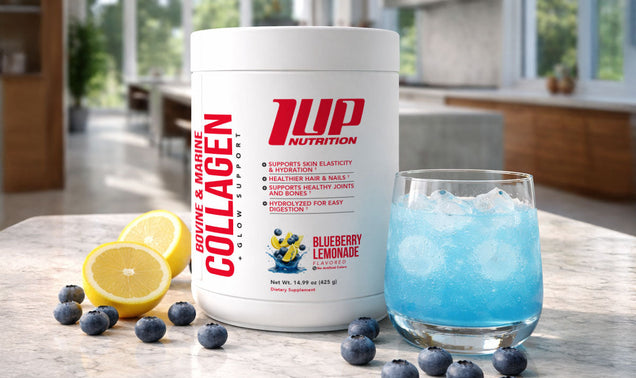Aside “how many calories do I need to eat to lose weight?”, the next most frequently asked question we receive is “can you gain strength while cutting?”
You’ll find a lot of conflicting opinions on the topic, but this short story is that, yes you can gain strength while cutting.
In this article, we’ll help you figure out how to do just that.
Let’s get started.
How Do I Gain Strength?
Building strength happens primarily as a result of three factors:
Increased ability of the central nervous system (CNS) to recruit muscle fibers
The brain is the command center for muscle force production via “neural drive”. Basically, the brain sends an electrical signal to the muscular system. This signal originates in the motor cortex and travels through the spinal cord to the neuromuscular junction -- a point where nerves that innervate the muscle and muscle fibers converge.
Activation of muscle fibers depends on your brain instructing these neurons to fire, which means that if the signal from the brain isn’t strong enough, the muscles will not fire to their full capacity - thereby limiting strength output and performance in the gym.
Therefore, to exert maximum force, your movements during training should be intentional, directed, and focused. The more “locked-in” you are to the movement you are performing, the stronger the signal will be from your brain to your muscles, leading to greater muscle fiber recruitment ultimately yielding stronger, more explosive lifting.
Technique improvement on a given lift
The saying goes that “you’re only as strong as your weakest link,” and nothing could be truer when it comes to gaining and demonstrating your strength.
The human body is one big kinetic chain, and where there is a weak link, there exists an energy “leakage” which directly impairs your ability to exert maximum force on the bar.
For example, let’s say that your knees fall inward when you squat. Aside from the potential injury concerns that accompany knee valgus, you’re also not able to squat as much weight as you truly are capable of due to the inefficiencies in your movement pattern.
The “cleaner” your technique is (i.e. the more efficiently your perform each repetition), the less energy and force that “leaks” from your kinetic chain, which means that you can produce more force to the bar and move more weight, which helps build strength.
Increased body weight and lean mass
After increasing neural drive and refining exercise technique, the last piece of the puzzle to gaining strength is to build more muscle. The reason for this is simple, the more muscle tissue you have, the greater potential there is to produce force.
In other words, the bigger and heavier you are, the more weight you are capable of moving.
Tips on Gaining Strength While Cutting
Utilize Nutrient Timing
While much has been made about the unimportance of nutrient timing in recent years, the simple truth of the matter is that it can play a significant role in your gym performance when cutting.
Having a high carb meal before training will ensure that glycogen stores are topped off and that there is enough blood sugar to keep energy levels high during training. Furthermore, having carbohydrates and amino acids in your bloodstream during training will help avoid muscle breakdown.
Additionally, consuming another higher carb meal after training will help kickstart the growth and recovery process and may help limit muscle soreness.
Low Volume, High-Intensity Training
Gaining strength requires you to lift heavyweight.
What exactly constitutes as “heavy” when we’re talking about building strength.
Generally speaking, you need to be training with weights that fall within 80-90% of your one-rep max (1RM). This corresponds to a weight you can lift for 3-8 repetitions.
Another reason you want to keep volume lower when cutting is that training with high reps is more glycogen depleting. Since you’re reducing the number of calories and carbohydrates you’re consuming, it would behoove your performance (and recovery efforts) to structure your training according to your current nutrition plan.
Get Enough Sleep
The importance of sleep cannot be stressed enough, especially when dieting.
Sleep is when our bodies repair the damage done during our waking hours. It’s also the time when the CNS recharges itself and gains energy for the next day’s activities.
Since strength is heavily reliant upon optimal firing of the CNS, it stands to reason that getting poor sleep will directly impact strength performance. And, there’s a number of studies documenting that sleep deprivation impairs strength.[1,2,3]
If you need help getting a quality night’s rest each night, check out 1UP Nutrition’s line of PM Recovery aids and natural sleep supplements.
Takeaway
Despite what you may have heard, it is entirely possible to gain strength while cutting. Now the gains in strength may not be as sizeable as they would be if you were in a calorie surplus (bulking phase), but you can gain strength when dieting for fat loss.
The keys to gaining strength are increasing CNS firing to recruit more muscle fibers and refining your exercise technique to eliminate any energy leaks in your kinetic chain. Gaining strength also requires training with heavy weights, resting enough, and getting sufficient sleep.
References
- Reilly, T., & Piercy, M. (1994). The effect of partial sleep deprivation on weight-lifting performance. Ergonomics, 37(1), 107–115. https://doi.org/10.1080/00140139408963628
- Brotherton, E. J., Moseley, S. E., Langan-Evans, C., Pullinger, S. A., Robertson, C. M., Burniston, J. G., & Edwards, B. J. (2019). Effects of two nights partial sleep deprivation on an evening submaximal weightlifting performance; are 1 h powernaps useful on the day of competition? Chronobiology International, 36(3), 407–426. https://doi.org/10.1080/07420528.2018.1552702
- Knowles, O. E., Drinkwater, E. J., Urwin, C. S., Lamon, S., & Aisbett, B. (2018). Inadequate sleep and muscle strength: Implications for resistance training. Journal of Science and Medicine in Sport, 21(9), 959–968. https://doi.org/10.1016/j.jsams.2018.01.012






